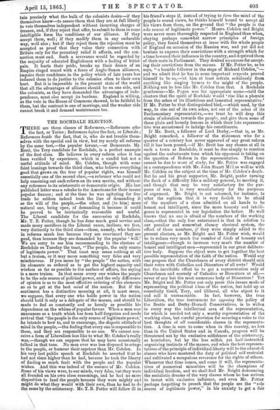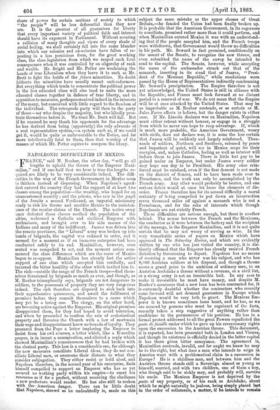THE ROCHDALE ELECTION.
THERE are three classes of Reformers,—Reformers after the fact, or Tories ; Reformers before the fact, or Liberals ; Reformers beside the fact, that is, who do not trouble them- selves with the special end in view, but try nearly all reforms by the same test,—the popular favour,—or Democrats. Mr. Brett, the Tory candidate for Rochdale, is a perfect example of the first class. He believes in every reform when it has been verified by experience, which is a candid but not a useful attitude of mind. Mr. Cobden, though with some faint leanings towards the third class, who believe everything good that grows on the tree of popular rights, was himself essentially one of the second class,—a reformer who could not help reasoning out each reform on its own merits, and without any reference to its aristocratic or democratic origin. His last published letter was a rebuke to the Americans for their insane popular finance ; and at the time he was agitating for free trade he seldom indeed took the line of demanding it as the will of the people,—the other, and (to him) more natural one, being open, of demanding it because it could he proved to be intrinsically reasonable and useful. The Liberal candidate for the succession at Rochdale, Mr. T. B. Potter, though he has done much good service and made many sacrifices in the Liberal cause, inclines, we fear, very distinctly to the third class—those, namely, who believe in reforms much less because they are convinced they are good, than because they are demanded by the popular ' will.' We are sorry to see him recommending to the electors of Rochdale on Tuesday the toast, "The people, the only source of legitimate power." That toast may mean nothing at all but a truism, or it may mean something very false and very mischievous. If you mean by " the people " the nation, with its elements so ordered as to get the highest capacity and wisdom so far as possible to the surface of affairs, the saying is a mere truism. In that sense every one wishes the people to be the sole source of political power, and the only difference of opinion is as to the most effective ordering of the elements so as to get at the best mind of the nation. But if the sentiment has a distinctive meaning at all, it must mean, we suppose, that every one who holds power in the nation should hold it only as a delegate of the masses, and should be made to feel as constantly and as keenly as possible his dependence on the whims of popular favour. When a man now announces as a truth which has been half-forgotten and needs revival that the people is the only source of legitimate po wer,' he intends to bow to, and to encourage, the despotic attitude of mind in the people,—the feeling that every one is responsible to them, and they are responsible to no one. We cannot con- ceive a form of Liberalism less like to what Mr. Cobden's really was,—though we can suppose that he may have occasionally talked in that tone. No man ever was less disposed to cringe to the people, or humour their caprices than Mr. Cobden. In his very last public speech at Rochdale he asserted that he had not risen higher than he had, because he took the liberty of finding so much fault with the people and the popular wishes. And this was indeed of the essence of Mr. Cobden. -Some of his views were, to our minds, very false, but they were all founded on his own close reasonings, and he had no more disposition to laud the people because they were mighty and might do what they would with their own, than he had to do the same by the aristocracy. Mr. T. B. Potter will follow ill in his friend's steps if, instead of trying to form the mind of the people to sound views, he thinks himself bound to accept all his views from them, on the ground that " the people is the sole source of legitimate power." Messrs. Cobden and Bright were never more thoroughly respected in England than when, obeying perhaps somewhat narrow principles of foreign policy, they found themselves at issue with the whole people of England on occasion of the Russian war, and yet did not hesitate to express their convictions with a strength which for a time lowered their influence in the country, and deprived them of their seats in Parliament. They desired no excuse for accept- ing their convictions from the masses. If Mr. Potter be, as he says, " a humble follower in the steps of Richard Cobden,"— and we admit that he has in some important respects proved himself to be so,—let him at least refrain sedulously from anything like singing hymns to the might of the people. Nothing can be less like Mr. Cobden than that. A. Rochdale gentleman—Mr. Pagan was his appropriate name—told the electors that the spirit of Rochdale would rise like a phoenix from the ashes of its illustrious and lamented representative.' If Mr. Potter be that distinguished bird,—which used, by the way, to rise out of its own ashes, not out of the ashes of its Parliamentary representative,—we trust he will drop this strain of adoration towards the people, and give them some of those plain and homely lessons in which their late representa- tive was accustomed to indulge his constituents.
If Mr. Brett, a follower of Lord Derby,—that is, as Mr. Bright remarked, a follower of the statesman who for a quarter of a century has never approved of any great reform till it has been passed,—if Mr. Brett has any chance at all in such a town as Rochdale, it must be due simply to reaction against the unfortunate tone which his opponent is taking on the question of Reform in the representation. That tone cannot be due to want of study, for Mr. Potter was engaged in a correspondence with Mr. John Stuart Mill as well as with Mr. Cobden on the subject at the time of Mr. Cobden's death. But he and his great supporter, Mr. Bright, prefer turning the flank of a difficulty like a military general, to meeting it, and though that may be very satisfactory for the pur- poses of war, it is very unsatisfactory for the purposes of argument. Mr. Bright is not ashamed, for instance, to utter the sophism that it is very foolish to be afraid of the numbers of a class admitted on all hands to be honest and intelligent, since the more honesty and intelli- gence is represented in our legislation the better. He well knows that no one is afraid of the numbers of the working class,—that the only fear entertained is that in relation to our peculiar and somewhat clumsy electoral system, the effect of those numbers, if they were simply added to the present electors, as Mr. Bright and Mr. Potter wish, would be to reduce very much the number of kinds of honesty and intelligence—though to increase very much the number of honest and intelligent men—represented in our great delibera- tive body. Suppose the object were to get together the best possible representation of the faith of the nation. Would any one propose that the Churchmen of every district should mix their votes with Catholics and Dissenters of all sorts? Would not the inevitable effect be to get a representation only of Churchmen and scarcely of Catholics or Dissenters at all,— never of any but the most numerous body of Dissenters ? Yet Mr. Bright and Mr. Potter not only press this insane mode of representing the political i leas of the nation, but hold up as essentially timid, Tory, and illiberal, all who object to it and call it unreasonable. In fact, however, the true Liberalism, the true instrument for opposing the policy of the Bretts and Derby-Disraeli Conservatives, is to widen in every way the intellectual area of the representation, for which is needed not only a worthy representation of the working class, but careful provision for securing a voice to the best thoughts of all considerable classes in the representa- tion. A time is sure to come when in this country, no less than in the United States and in Canada, progress will be threatened not by the exclusive selfishness of the aristocracy, as heretofore, but by the less selfish yet half-instructed organizing instincts of the masses, and when the best represen- tatives of the principle of individual liberty will be the educated classes who have mastered the duty of political self-restraint and cultivated a scrupulous reverence for the rights of others. Whenever that time comes, and come it will, the representa- tives of numerical minorities will be the champions of individual freedom, and we shall find Mr. Bright denouncing the socialistic dreams of the very classes whom he has striven to invest with exclusive influence, and even Mr. Potter perhaps forgetting to preach that the people are the " sole source of legitimate power," in his anxiety to get a fair share of power for certain sections of society to which "the people" will be less deferential than they now are. It is the greatest of all guarantees for liberty that every important variety of political faith and interest should have its exponent in Parliament. Without securing a collision of many thoughts and views of every shade of social feeling, we shall certainly fall into the same blunder into which our colonies and ex-colonies have fallen of re- peating in a less pernicious form, for the great working class, the class-legislation from which we reaped such fatal consequences when it was controlled by an oligarchy of rank and wealth. Mr. Bright and Mr. Potter are weakening the hands of true Liberalism when they leave it to such as Mr. Brett to fight the battle of the future minorities. No doubt hitherto the minorities have usually meant anti-reformers. But everything which tends to concentrate the political power in the less educated class will also tend to unite the more educated classes together in defence of true liberty, and in opposition to measures, perhaps conceived indeed in the interests of the many, but conceived with little regard to the freedom of the individual. The retrograde party will then be the party of those—not who despise the majority, but who blindly pros- trate themselves before it. We trust Mr. Brett will fail. But if he succeed he may thank his opponents for the advantage he has derived from being (apparently) the only advocate of a real representative system,—a system such as, if we could get it, would be quite as unfavourable to the Tories, and far more intellectually fatal to them, than that worship of the masses of which Mr. Potter aspires to compose the litany.































 Previous page
Previous page